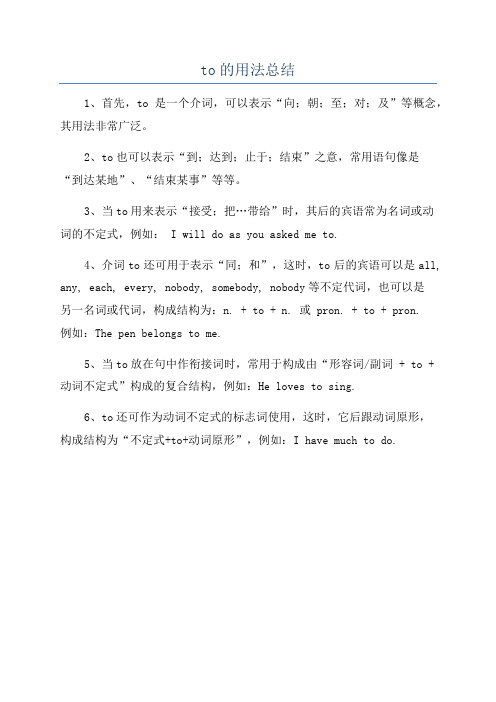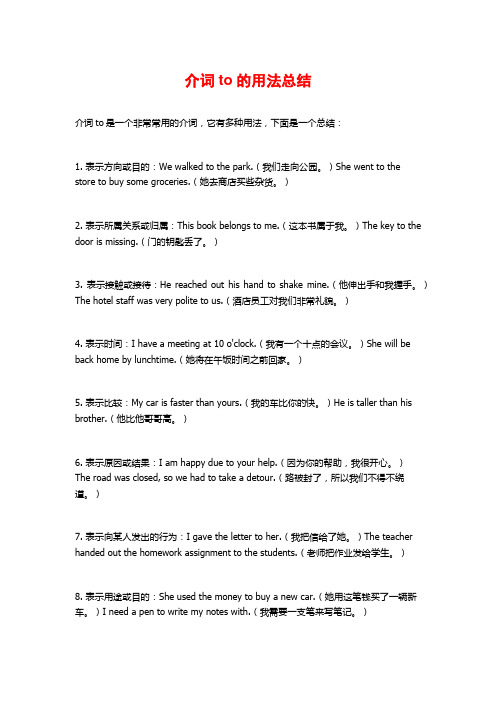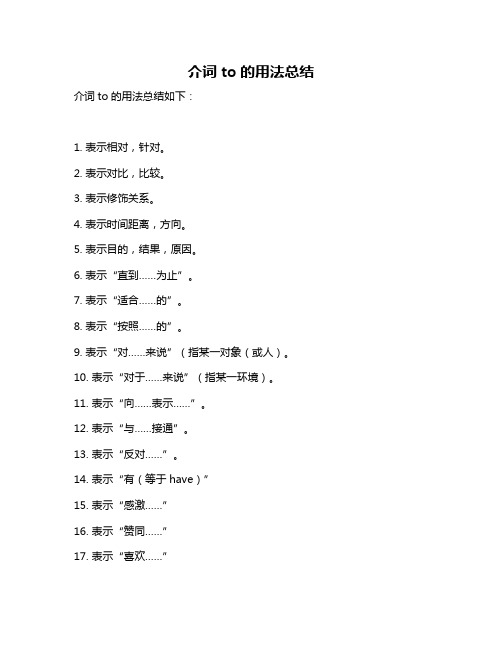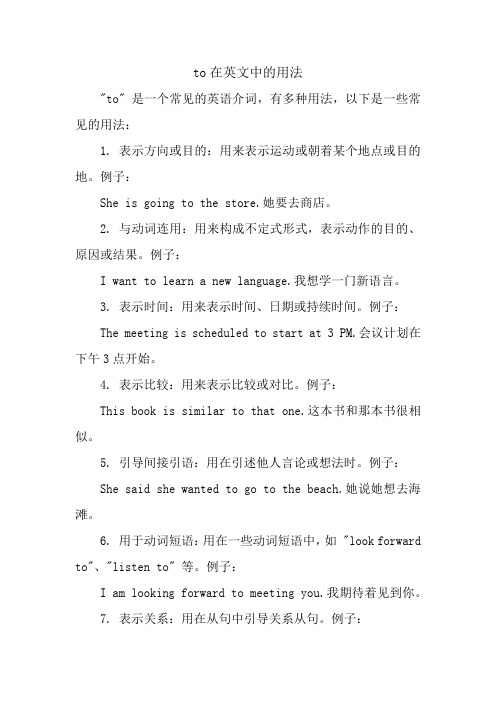to 用法总结
to的用法总结

to的用法总结
1、首先,to是一个介词,可以表示“向;朝;至;对;及”等概念,其用法非常广泛。
2、to也可以表示“到;达到;止于;结束”之意,常用语句像是
“到达某地”、“结束某事”等等。
3、当to用来表示“接受;把…带给”时,其后的宾语常为名词或动
词的不定式,例如: I will do as you asked me to.
4、介词to还可用于表示“同;和”,这时,to后的宾语可以是all, any, each, every, nobody, somebody, nobody等不定代词,也可以是
另一名词或代词,构成结构为:n. + to + n. 或 pron. + to + pron.
例如:The pen belongs to me.
5、当to放在句中作衔接词时,常用于构成由“形容词/副词 + to + 动词不定式”构成的复合结构,例如:He loves to sing.
6、to还可作为动词不定式的标志词使用,这时,它后跟动词原形,
构成结构为“不定式+to+动词原形”,例如:I have much to do.。
to的用法总结

to的用法总结1. 介绍在英语中,to是一个非常常见的词汇,有多种用法和含义。
本文将总结to在不同情况下的用法,帮助读者更好地理解和运用to。
2. 表示方向或目的to经常用来表示方向或目的。
例如:•表示运动的方向:I’m going to the park.(我要去公园。
)•表示目的地:He’s going to London.(他要去伦敦。
)3. 表示时间to可以用来表示时间的范围或截止日期。
例如:•表示时间范围:From Monday to Friday.(从星期一到星期五。
)•表示截止日期:The assignment is due to next week.(作业截止日期是下周。
)4. 表示比较to可以用来表示比较两个事物或状态的差异。
例如:•表示比较:This movie is better than the previous one.(这部电影比上一部更好。
)•表示差异:He’s taller compared to his brother.(和他哥哥相比,他更高。
)5. 表示目标to还可以用来表示目标、意图或计划。
例如:•表示目标:I’m studying har d to pass the exam.(我努力学习以通过考试。
)•表示意图:I want to learn a new language.(我想学一门新语言。
)•表示计划:We are going to have a meeting next week.(我们下周要开会。
)6. 表示属于to可以用来表示某事物属于或与某人有关。
例如:•表示属于:This book belongs to me.(这本书是我的。
)•表示与某人有关:I need to talk to my boss.(我需要和我的老板谈话。
)7. 表示转变to可以用来表示转变或过渡的状态。
例如:•表示转变:She went from sad to happy.(她从悲伤变为快乐。
介词to的用法总结

介词to的用法总结介词to是一个非常常用的介词,它有多种用法,下面是一个总结:1. 表示方向或目的:We walked to the park.(我们走向公园。
)She went to the store to buy some groceries.(她去商店买些杂货。
)2. 表示所属关系或归属:This book belongs to me.(这本书属于我。
)The key to the door is missing.(门的钥匙丢了。
)3. 表示接触或接待:He reached out his hand to shake mine.(他伸出手和我握手。
)The hotel staff was very polite to us.(酒店员工对我们非常礼貌。
)4. 表示时间:I have a meeting at 10 o'clock.(我有一个十点的会议。
)She will be back home by lunchtime.(她将在午饭时间之前回家。
)5. 表示比较:My car is faster than yours.(我的车比你的快。
)He is taller than his brother.(他比他哥哥高。
)6. 表示原因或结果:I am happy due to your help.(因为你的帮助,我很开心。
)The road was closed, so we had to take a detour.(路被封了,所以我们不得不绕道。
)7. 表示向某人发出的行为:I gave the letter to her.(我把信给了她。
)The teacher handed out the homework assignment to the students.(老师把作业发给学生。
)8. 表示用途或目的:She used the money to buy a new car.(她用这笔钱买了一辆新车。
to 用法

to 用法to的基本用法•用作介词:表示方向、目的、结果等。
举例:I am going to the park.(我要去公园。
)•用作副词:表示方向或动作的完成,常与动词原形连用。
举例:He went to school.(他去学校了。
)•用作介词:表示给予或使用的对象。
举例:I gave the book to my friend.(我把书给了我的朋友。
)to在不同短语中的用法短语 1:to do something•这个短语表示目的或意图。
举例:I went to the store to buy some groceries.(我去商店是为了买些杂货。
)短语 2:be used to•用于表示习惯或适应。
举例:She is used to getting up early.(她习惯早起。
)短语 3:together•表示一起或同时。
举例:We went together to the party.(我们一起去参加晚会。
)•表示来回移动或摇摆。
举例:The pendulum swung to and fro.(钟摆来回摆动。
)短语 5:to one’s s urprise•表示出乎某人的意料。
举例:To my surprise, I won the competition.(使我惊讶的是,我赢得了比赛。
)短语 6:to some extent•表示在一定程度上。
举例:To some extent, I agree with your opinion.(在某种程度上,我同意你的观点。
)短语 7:to be honest•表示坦率或诚实。
举例:To be honest, I don’t really like that movie.(说实话,我真的不喜欢那部电影。
)短语 8:to take advantage of•表示利用或占便宜。
举例:He tried to take advantage of the situation.(他试图利用这种情况。
to的用法总结归纳

to的用法总结归纳以下是小编为大家整理的to的用法总结,希望能帮助大家更好地认识to这个单词,提高英语水平。
to的意思:prep.向,朝着; 到; 关于; 属于;adv.朝一个方向的; 到某种状态; 关闭;to的用法总结:一:表示相对,针对be strange (common, new, familiar, peculiar, distinct, sensitive,immune, vulnerable, indispensable) toAir is indispensable to life.Aircrafts are vulnerable to interference caused by radiation.This injection will make you immune to infection.二:表示对比,比较1:以-ior结尾的形容词,后接介词to表示比较,如:superior ,inferior,prior,senior,juniorThe quarrel happened prior to my arrival.2: 一些本身就含有比较或比拟意思的形容词,如equal,similar,equivalent,analogousA is similar toB in many ways.3:表示一些先后顺序的形容词,如:second,subsequent,next,preliminary,preparatorySubsequent to the war,they returned to their hometown.4: to也偶尔出现在个别动词之后,与动词形成固定词组,表示比较,如:prefer to,compare to,incontrast tocompare to sth.表示比喻或比拟,而compare with sth.表示比较,如:World is usually compared to a stageCompared with his past,he has changed a lot.Prefer的正确句型是:prefer A to B或prefer doing A to doing B,但当prefer后接动词不定式时,表示比较的介词to就要改成rather than ,如:The undaunted soldier preferred death to surrender.Many people prefer spending money to earning money.They prefer to pursue careers rather than remain home as house wives.5: to与及个别的名词构成比较之意,如:alternativeGoing to an under water concert is a great alternative to going to dinner.三: 表示修饰关系1: 表示回复,反应意思的词,如:answer to question,solution to problem,response to inquiry,reaction to proposal,reply to letter2: 表示建筑构件的词汇,如: entry,entrance,approach,access,passage,exit,vent,path the approach to a bridge引桥the approach to scienceHalf of the population was estimated to have no access to the health service.The access to education 接受教育的机会The access to medical care 享受公费医疗的权利3: 表示人物职位和官衔的词,如:assistant to manager, ambassador to Spain, successor to tradition,heir tothrone,deputy to the National People’s Congressadvisor to the Prime Minister4: 表示权利和许可的词汇,如:right,admissionThe employee finally got the admission to the boardroom.Everyone has an equal right to ……..5: 表示栅栏或障碍的词汇,如:bars to development,the barrier toprogress6: 表示与书籍,文本相关的词,如:introduction to passage.7: 表示恭喜或是祝贺,如:The director proposed a toast to the health of the guests.Let's drink to Dick’s success in business8: 另外还有一些名词符合这种用法,有的具有两者息息相关,缺一不可的含义.如:key todoor,invitation toparty,guide to action,limitation to life,accessory to school四: to还具有依据,伴随,和着节奏的含义,如:sing to piano, chance to the tune, stamp to the rhythm of the song, add salt to taste(一):表示相关联,相连接,如:be related to,be relative to,in relation to,be relevant to,link toInvestigate all the facts related to the problem.People often linked walth to happiness.(二):表示反对和赞同。
to用法总结

一、动词+介词to+动名词Apply to doing sth.Object to doing sth.See to doing sth.Stick to doing sth.Take to doing sth.He admitted having stolen the money. 他承认偷了钱。
These methods apply to learning English. 这些方法适用于英语学习。
He objected to being treated like a child. 他反对被当作小孩子看待。
Reporters should stick to investigating the facts. 记者应坚持调查事实。
Soon he took to sleeping late. 不久他就养成了睡懒觉的习惯。
二、动词+宾语+介词to+动名词Apply oneself to doing sth. 专心致力于做某事Devote sth to doing sth. 把…献给做某事Devote oneself to doing sth. 献身于做某事Limit sth to doing sth. 把…限制在做某事的范围内Reduce sb. To doing sth. 使某人沦为做某事Give one’s life to doing sth. 献身于做某事Give on e’s mind to doing sth. 专心做某事Have a dislike to doing sth. 厌恶做某事Have an eye to doing sth. 注意做某事Have an objection to doing sth. 反对(反感)做某事Pay attention to doing sth. 注意做某事Set one’s mind to doing sth. 决心做某事She applied herself to learning English. 她专心学习英语。
介词to的用法总结

介词to的用法总结介词to的用法总结如下:
1. 表示相对,针对。
2. 表示对比,比较。
3. 表示修饰关系。
4. 表示时间距离,方向。
5. 表示目的,结果,原因。
6. 表示“直到……为止”。
7. 表示“适合……的”。
8. 表示“按照……的”。
9. 表示“对……来说”(指某一对象(或人)。
10. 表示“对于……来说”(指某一环境)。
11. 表示“向……表示……”。
12. 表示“与……接通”。
13. 表示“反对……”。
14. 表示“有(等于have)”
15. 表示“感激……”
16. 表示“赞同……”
17. 表示“喜欢……”
18. 表示“被……”,表示被动。
19. 表示超出比例的或超出的量。
20. 表示趋势或倾向,如倾向于、有利于。
21. 表示条件,在…情况下。
22. 表示让步,在…情况下。
23. 表示时间点,在…时刻。
24. 表示时间长度,在…期间。
25. 表示地点,方向,朝向。
26. 表示“距离…”多远,“到达”等意义。
27. 与某些表示数量的词组连用,表示“每…”
28. 用于某些固定搭配中。
29. 用于某些固定句型中。
30. 用于某些动词短语中。
31. 用于引导从句。
32. 用于某些惯用语中。
33. 用于某些特殊结构中。
34. 用于某些表达方式中。
35. 用于某些表达情感或态度的句子中。
to在英文中的用法

to在英文中的用法
"to" 是一个常见的英语介词,有多种用法,以下是一些常见的用法:
1. 表示方向或目的:用来表示运动或朝着某个地点或目的地。
例子:
She is going to the store.她要去商店。
2. 与动词连用:用来构成不定式形式,表示动作的目的、原因或结果。
例子:
I want to learn a new language.我想学一门新语言。
3. 表示时间:用来表示时间、日期或持续时间。
例子:
The meeting is scheduled to start at 3 PM.会议计划在下午3点开始。
4. 表示比较:用来表示比较或对比。
例子:
This book is similar to that one.这本书和那本书很相似。
5. 引导间接引语:用在引述他人言论或想法时。
例子:
She said she wanted to go to the beach.她说她想去海滩。
6. 用于动词短语:用在一些动词短语中,如 "look forward to"、"listen to" 等。
例子:
I am looking forward to meeting you.我期待着见到你。
7. 表示关系:用在从句中引导关系从句。
例子:
She is the person to whom I spoke yesterday.她是我昨天和她说话的人。
"to" 是一个非常常见的介词,在英语中有多种用法,需要根据上下文来理解其具体含义。
- 1、下载文档前请自行甄别文档内容的完整性,平台不提供额外的编辑、内容补充、找答案等附加服务。
- 2、"仅部分预览"的文档,不可在线预览部分如存在完整性等问题,可反馈申请退款(可完整预览的文档不适用该条件!)。
- 3、如文档侵犯您的权益,请联系客服反馈,我们会尽快为您处理(人工客服工作时间:9:00-18:30)。
be/get/become used to 习惯于
be related to 与…有关系
be addicted to 沉溺于;对…上瘾
be opposed to 反对
devote oneself to献身于;专心于
be devoted to 致力于;忠诚于
be admitted to 被…录取;准进入
be reduced to 沦为
reduce…to…使…沦为
be attached to附属于;喜欢;依恋
be adjusted to 适应
be sentenced to被判处
be exposed to 暴露于;遭受
be/become/ get accustomed to//accustomed to 惯于;有…习惯be engaged to 与…订婚
get down to 着手做
lead to 导致
object to反对;不喜欢;不赞成
give rise to 引起
stick to 坚持;
see to 负责;注意
contribute to对…作贡献;有助于
make contributions to对…作贡献
apply oneself to 致力于
in addition to除…之外
turn to转向;求助于
look up to 尊敬
belong to 属于
take to 喜爱;开始
respond to 回答;对…作出回应
amount to等于
refer to 谈到;参考;查阅
turn a blind eye to对…视而不见
turn a deaf ear to 对…充耳不闻
show honour to向…表示敬意
propose a toast to 提议……
set fire to 放火烧……
occur to sb. 想起;想到
hold to 坚持;抓住
help oneself to 随便用……
hold on to 抓住;固守
do harm to 对……有害处
do wrong to 冤枉某人
date back to 追溯到
when it comes to… 谈到……时
pay a visit to 参观……
the key to ……的答案
access to 进入;取得的方法
on one’s way to 在去某处的路上;在达成某事的过程中
be a stranger to 不习惯;对……陌生
be senior to 年龄长于……
be junior to年龄小于……
be equal to 和……相等
be particular to ……所特有的(比较:be particular about 对……过于讲究;挑剔)
be subject to 服从;隶属;易遭\受\患
be familiar to 为……熟悉
be similar to 和……相似
be open to 对……开放
be loyal to 对……忠诚
be helpful to对……有益处
be useful to对……有用
do good to sb对某人好
(比较:be good for 对……有益处)
do bad to 对……不好
be bad for(比较:对……有害处)
be new to 对……不习惯;对……陌生
due to 由于;归因于……
owing to 由于;因……的缘故
thanks to 多亏了;由于
as to 关于;至于
in/with regard to 关于
be entitled to
be equivalence of 、、、with、、、、
be dedicated to doing。
